According to Statistics Canada (2017), only 0.02% of carpenters and cabinetmakers are women, placing these trades among the top 20 male-dominated occupations. These stats did not stop Angel Magher, who hails from Beauce, from exploring her passion and following her heart. Over the years and through her work experience in different workshops, not to mention teaching, Angel has become a master of woodworking; handcrafted and mass-produced furniture hold no secret for her, nor do mouldings or staircases.
From Farming to Woodworking
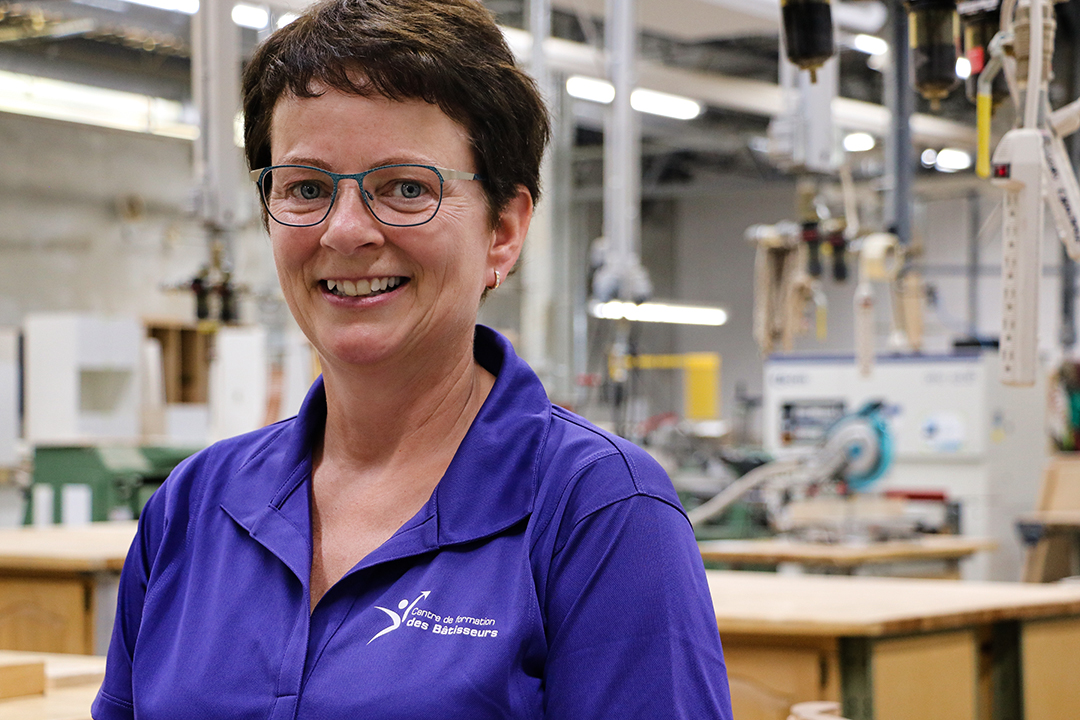 By Secondary IV, Angel Magher was already embarking on a career path she would never leave: cabinetmaking.
By Secondary IV, Angel Magher was already embarking on a career path she would never leave: cabinetmaking.Angel Magher, 54, recalls that she always enjoyed school, although dyslexia made reading and writing difficult. The seventh of nine children in a close-knit family, she grew up in Saint-Odilon-de-Cranbourne on her parents' farm. "I was interested in all of these "male" trades, especially those that required manual skills," she recalls. "With the chores on the farm, all of my siblings developed that kind of talent. As a child, I would create toys out of bits of cardboard. On Sundays, I would spend hours admiring the crown moldings in church, wondering how they were made." In Secondary III, at the Polyvalente Veilleux in Saint-Joseph-de-Beauce, Angel took a class on vocational career exploration. "We were introduced to different trades, and when I discovered cabinetmaking, that gave me a life goal." The following year, in Secondary IV, she took a woodworking course in Saint-Georges.
"We were introduced to different trades, and when I discovered cabinetmaking, that gave me a life goal."
A Girl Among Guys
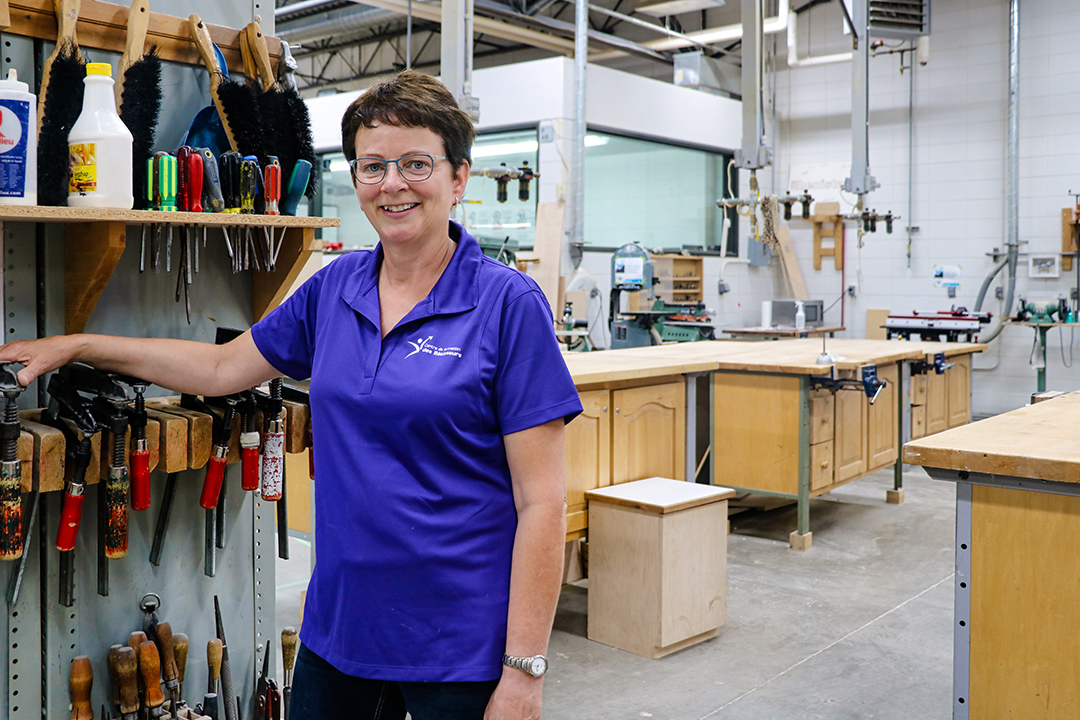 In 1985, she was the first female to obtain a diploma in Patterns, Templates, Jigs, Fixtures, and Prototypes at the École nationale du meuble et de l'ébénisterie.
In 1985, she was the first female to obtain a diploma in Patterns, Templates, Jigs, Fixtures, and Prototypes at the École nationale du meuble et de l'ébénisterie.As a scholarship student at the École nationale du meuble et de l'ébénisterie in Victoriaville, Angel was passionate about her classes. She took a class on large-scale production followed by a class on patterns, templates, jigs and fixtures, which are today part of the DVS in Cabinetmaking. She focused all of her attention on her projects, and the then 19-year-old quickly knew that she had made the right decision. In 1985, she was the first woman to graduate from the École nationale du meuble et de l'ébénisterie with a degree in Patterns, Templates, Jigs, Fixtures, and Prototypes. During her training, she met the man she has now been married to for 34 years. Over the years, they have shared various projects related to their love of wood. They have made almost all of the furniture in their home. During the COVID-19 pandemic, they rebuilt a small camper from scratch that they now use to travel the region.
In 1985, she was the first woman to graduate from the École nationale du meuble et de l'ébénisterie with a degree in Patterns, Templates, Jigs, Fixtures, and Prototypes.
Resisting Prejudice
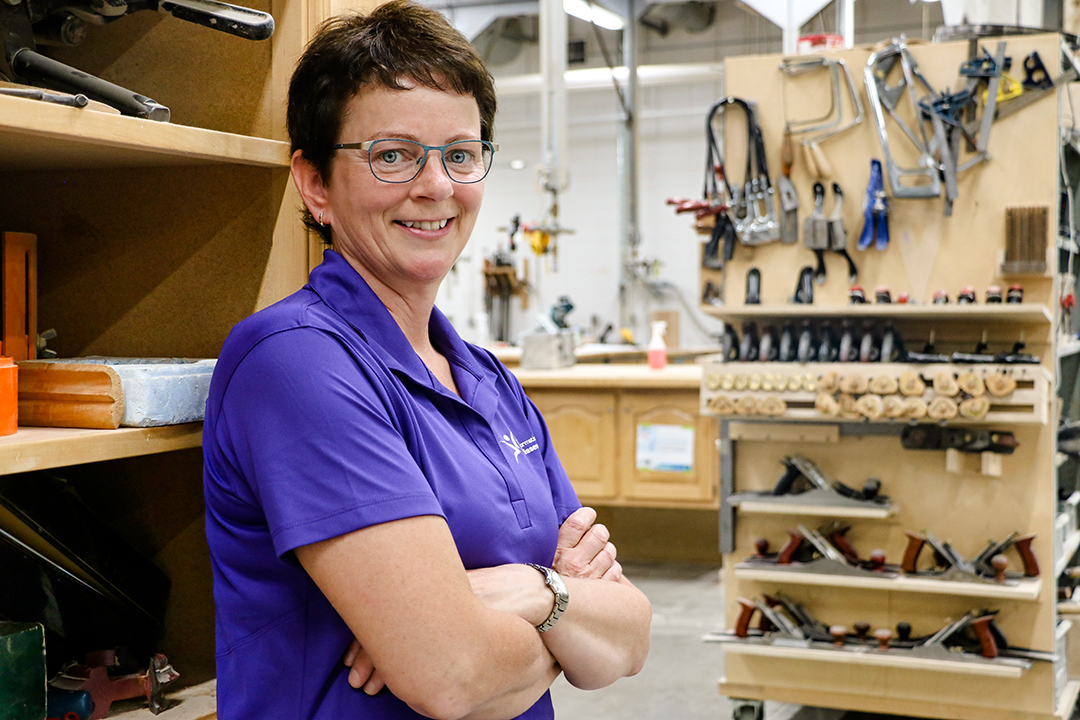 At the Centre de formation des bâtisseurs in Sainte-Marie, Beauce, where she is now a teacher, she encourages future generations, especially girls, to be bold and believe in their skills.
At the Centre de formation des bâtisseurs in Sainte-Marie, Beauce, where she is now a teacher, she encourages future generations, especially girls, to be bold and believe in their skills.Being a female cabinetmaker in a man's world has never held Angel back, and for as long as she can remember, she has always managed to thrive in her craft. Naturally, she adopted a discreet attitude, focusing on jobs well done and turning a deaf ear to the teasing. "With five brothers, I had a lot of practice," she laughs. However, she has noticed that in predominately male trades, women are often confined to certain jobs. In cabinetmaking, this translates to restricting them to tasks related to finishing because, as she has often heard, "women are so good at that." Angel admits, "I get insulted when people label me. Women are just as skilled and versatile as men."
Apprenticeships
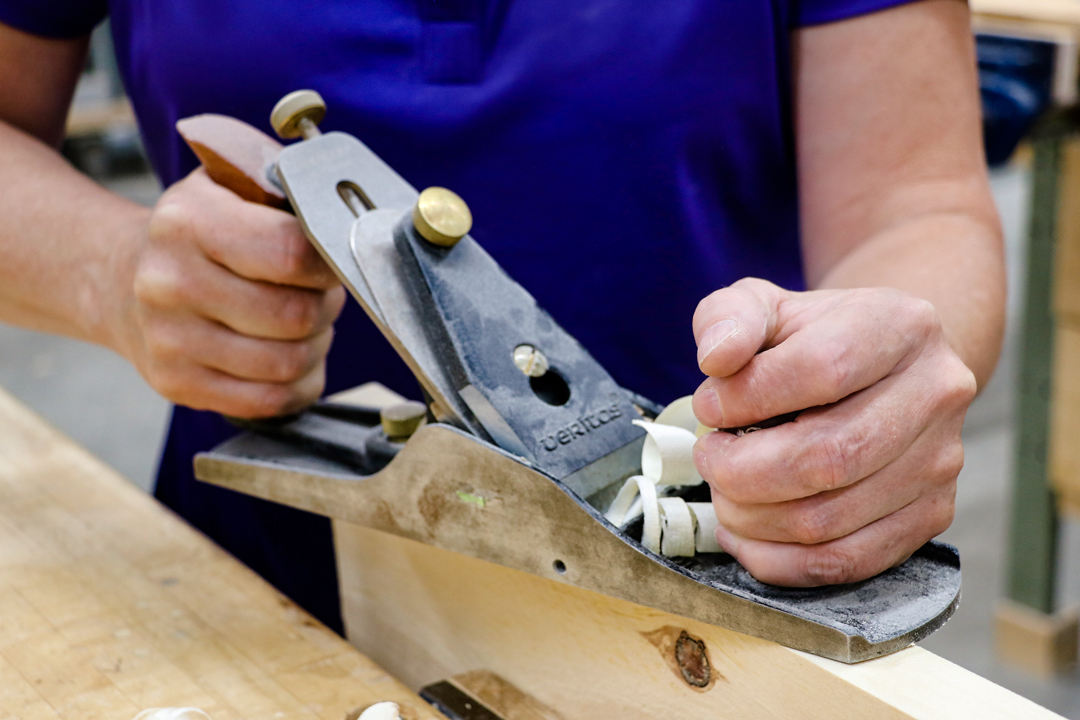 What about the Skills Competition? "I love the discussions with other teachers, and we encourage each other, learn new techniques, and reassure each other about certain ways of doing things." Angel Magher
What about the Skills Competition? "I love the discussions with other teachers, and we encourage each other, learn new techniques, and reassure each other about certain ways of doing things." Angel MagherWhile she was studying, Angel got the opportunity to work as an apprentice with a cabinetmaker that built furniture in Saint-Joseph-de-Beauce during the summer. "He taught me all of his artisanal know-how." She then worked at Clermont Grenier for ten years, a company specializing in kitchens, where she made prototypes before mass production. Then, for four years, she learned a whole new aspect of cabinetmaking in a company that fabricated staircases. But the industry fell on hard economic times, and the company where she worked was on the verge of bankruptcy.
Teaching Future Generations
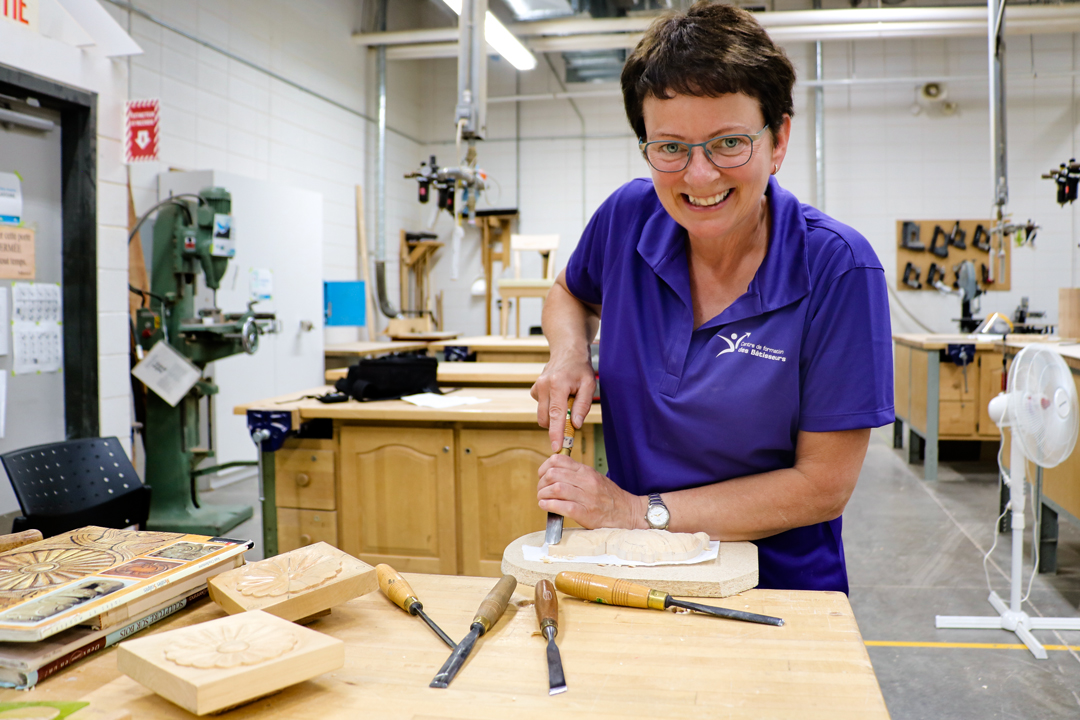 Being a judge at the Skills Competition was also a formative experience for her classes at the Centre de formation des bâtisseurs.
Being a judge at the Skills Competition was also a formative experience for her classes at the Centre de formation des bâtisseurs.This was 20 years ago. Angel Magher traded the factory for the classroom and began teaching at the Centre de formation des bâtisseurs in Sainte-Marie, Beauce. At first, this career change posed a great challenge, so much so that she initially declined the offer, only to reconsider a year later. Despite her learning disability, she tackled university courses, overcame her shyness, learned to structure her classes according to government requirements, and overcame her reluctance to read and express herself in public, which remains challenging due to her dyslexia. "One of my aunts helped me with all of my French coursework during the education courses. At first, at my vocational centre, reading in front of a group was a nightmare," she admits. "As for the job, my colleagues and students would test me, but as my work experience has allowed me to touch on everything, I know that I am a teacher that masters their art."
The Skills Competition Legacy
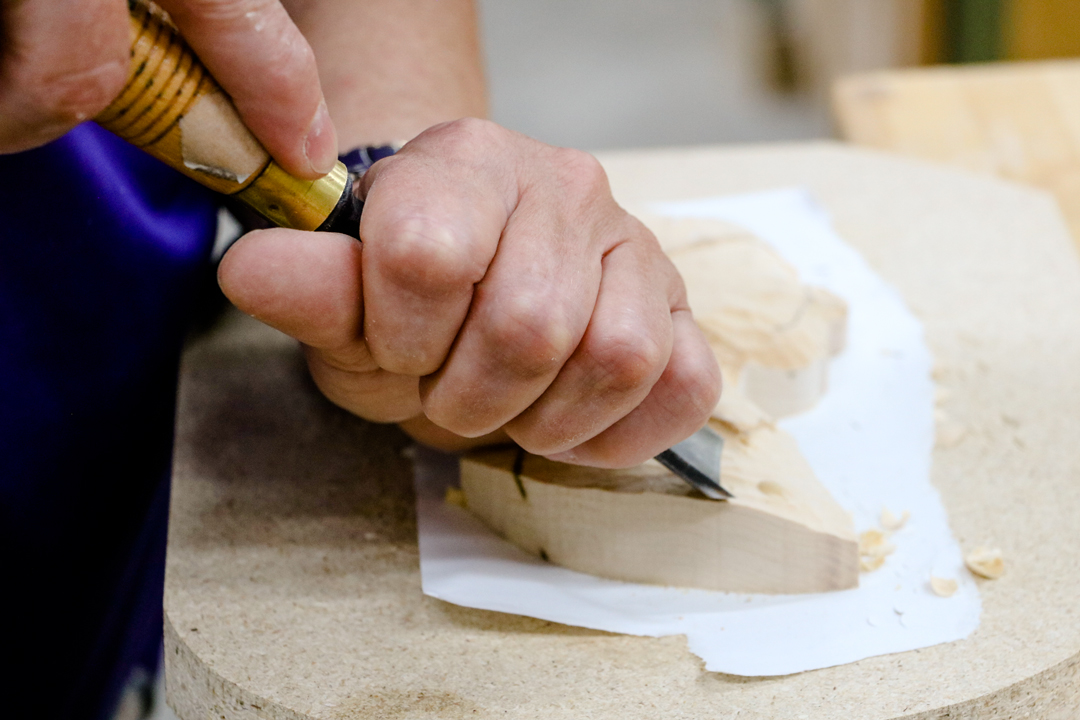 Angel Magher affirms that the Skills Competition allows her to transmit her love for the trade and witness small miracles: young students who give it their all and share the same passion.
Angel Magher affirms that the Skills Competition allows her to transmit her love for the trade and witness small miracles: young students who give it their all and share the same passion.For 15 years, Angel Magher dedicated time to the Québec Skills Competition as a coach and judge. One of her young protégés, Axel Vocal, even made it to the 2011 International WorldSkills Competition in London. An appetite for competition remains the main motivator for this teacher. "It's as if this competition has allowed me to enter other schools, observe how others work, and compare myself to them," she explains. Angel admits she learned a great deal from this experience. "I love the discussions with other teachers, and we encourage each other, learn new techniques, and reassure each other about certain ways of doing things. Being a judge also allowed me to improve my skills when evaluating my own students. But above all, the competition allows us to transmit our love for the trade and witness small miracles: young students who give it their all and who share the same passion."
"The competition allows us to transmit our love for the trade and witness small miracles: young students who give it their all and who share the same passion."
A Trade for Passionate People
Cabinetmaking is one of the oldest trades in the world. The artisanal techniques and traditions have been passed down for centuries, and the industrial revolution led to a whole industry of wood furniture making. Whether a cabinetmaker works with simple or sophisticated tools, the passion for a job well done is common to the people practicing this trade. "I enjoy caressing wood. Each type of wood has a little something special, especially those native to Québec. I like shaping things with my hands and, above all, I get immense satisfaction from a well-crafted piece of furniture that will last a lifetime, if not longer. Perhaps it stems from the fact that coming from a big family, my parents did not have much time to praise us, and beautiful woodwork always impresses people. Not all trades garner admiration."
Choosing a Traditionally Male-Dominated Trade
As a teacher, Angel is overjoyed to see young women going into her field and encourages them. "Choosing a non-traditional path takes a lot of perseverance. You have to be a bit daring, but the most important thing is believing in yourself. Don't put up unnecessary barriers. I sometimes argue with my students, male or female, when they say they are not good. What a waste to devalue oneself and close doors for oneself." According to Angel, women tend to underestimate themselves, especially when tasks demand a certain level of physical strength. "When I finished school at 19, I weighed about 105 pounds, but I had a strong mind." For her, being able to experience a year of career exploration made a world of difference, and she hopes young women can have a similar experience.
"Choosing a non-traditional path takes a lot of perseverance. You have to be a bit daring, but the most important thing is believing in yourself. Don't put up unnecessary barriers. I sometimes argue with my students, male or female, when they say they are not good. What a waste to devalue oneself and close doors for oneself."
